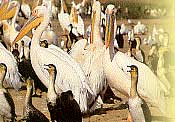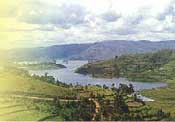 |
 |
 |
|
|||
|
The Real African Experience Brutality in Uganda isn't a particularly new thing. This huge conical church is the Uganda Martyrs shrine in Namugongo, a few miles outside the capital Kampala. A tour guide tells me the church is dedicated to 22 of Uganda's first Christians who were burnt alive at the stake nearly a hundred years ago for refusing to renounce their faith. The beautifully carved doors graphically illustrate their fate.
Tour guide: "They were wrapped in firewood rings and set afire. They lit the fire from the feet to consume them very slowly and painfully." 
Back in the bustling modern African city of Kampala, there's a living reminder of this country's more recent violent history. Throughout the city you'll find storks, not the pretty pink birds you see delivering babies on the front of greetings cards, but awful, dirty, mangy things as big as dogs, scavenging in the rubbish. Legend has it that they arrived in the 70s during Idi Amin's regime. Over the eight years of his rule 300,000 Ugandans were murdered. It's said the storks fed off the bodies, and they've never left. There are few people here over the age of 40 who don't have a story to tell. Edward Muhima was a high school teacher in 1972 when, he tells me, one of his pupils was arrested, falsely accused of treason and executed in front of his teachers and classmates.
Edward: "On this fateful day, he was killed in the firing squad. He was killed twenty yards from me because on this day, when these people were going to be killed, we heard an announcement that the head Marshall, the head Marshall of the school, the chaplain and the student body must come to the stadium. And so we came. And this young man comes together with the suspects and they are lined up against the wall of the stadium and I saw him go. I just couldn't stand it and so I began to talk." 
Edward talked and talked. He became an outspoken critic of the regime and in the end, after receiving death threats, had to flee for his life to America. It's not the sort of tale you'd normally want to hear on holiday, but it still feels a privilege as a traveler to meet people like Edward and to hear them share their stories. The past may be grim, but this green, fertile country is coming back to life. And for the traveler, that's good news. You've got the great local music in the hotels and bars and then there's the countryside. Unless you're feeling suicidal, don't use the buses. You'll understand what I mean when you see how they're driven. It's probably not worth trying to drive yourself either. I didn't see one single signpost in all my travels. Hire a driver, but fasten your seat belt. We're east of Kampala looking for the source of the Nile, but it's the rainy season. After 20 minutes stuck at the bottom of a dangerously skiddy, muddy hill, wondering how we're going to get to the top, Matthias, my driver, decides there's only one way: fast. Aaagh.
Martin: "Well, it's earth. That was close though. We went up that hill with real speed. But at the top, there was a truck that had broken down and we were going with such speed that when we had to brake, we knew that the car was going to go out of control. We braked just in time. Well done. Good driving, we made it." I've never been so scared. Not sure this was worth risking my face through a windscreen for, but hey, what a view. The Bujugali Falls are fabulous, just a couple of miles on from the source of the Nile, which we, err, missed. Well, it wasn't signposted was it? But I'll settle for this. The next day we head west through the verdant tea, coffee and sugar plantations, stopping off in what appears to me the middle of nowhere.
Martin: "This is a very special spot. We've just stopped on the side of the road. On the Kampala road, there's a tree here full of the most beautiful bright yellow birds and their nests are all upside down. The hole is from underneath and that's how they climb into them. But that's not why we've stopped. This is the equator. There's a sign over here that says "Uganda -- Equator North/South" and as I talk to you now, I am crossing the equator."
There's an entrepreneurial young man here who, for a few dollars, is showing me a great roadside scientific demonstration. Standing in the Northern Hemisphere he fills a bowl with water and then unplugs his finger from a hole in the bottom. Just like emptying a bath, the water swirls and glugs round. Every time he does it, it goes counter-clockwise. A few footsteps away, on the Southern side of the equator he does the same thing.

I can't believe it, right on the equator, no gluggling, no swirling, and straight down the hole. A physicist tells me later that it's all to do with the earth's spin and the Coriolis force. Don't ask me to explain it though. When it comes to science I'm, as we say in Britain, thick as two short planks. This is a really friendly place and I didn't feel particularly threatened, though obviously you don't flaunt your wealth or go wandering the streets alone late at night. You also have to keep a check on which parts of the country it's safe to visit, avoid the far north and the borders with Rwanda and the Republic of Congo. Most tourists here want to visit the gorillas in the mists of the Bwindi Impenetrable Forest. But last year, several Western tourists were kidnapped and murdered there by rebels from Congo. Check out the State Department's travel advisory website before setting off and take advice locally when you arrive. Even if you do miss these parts, that still leaves plenty of Uganda to see. Winston Churchill didn't call it the pearl of Africa for nothing. There's Lake Victoria, the seven hills of Kampala and the national parks. There isn't much wildlife in them yet, the parks were hunted empty during Idi Amin's regime, but a side effect of the lack of grazing elephants is a lush, green landscape which is breathtaking. This is a great country that isn't really geared up to tourists yet, but if you want the real African experience and not the sanitized, crowded package-tour version, this is a good place and a good time to visit. From Kampala in Uganda, this is Martin Stott for The Savvy Traveler.
|
 | American Public Media Home | Search | How to Listen ©2004 American Public Media | Terms of Use | Privacy Policy |
